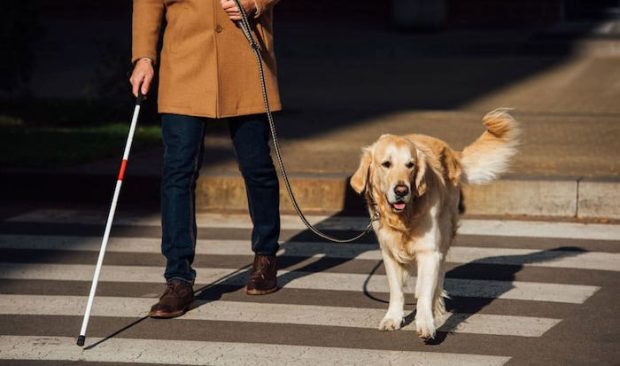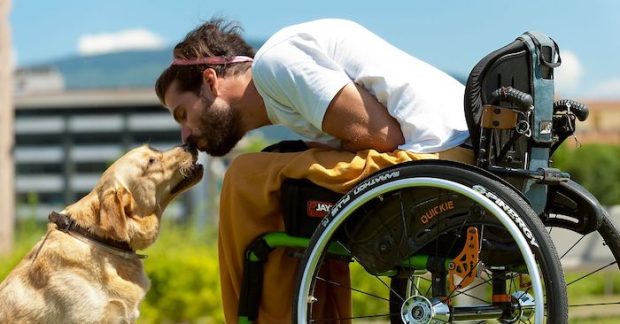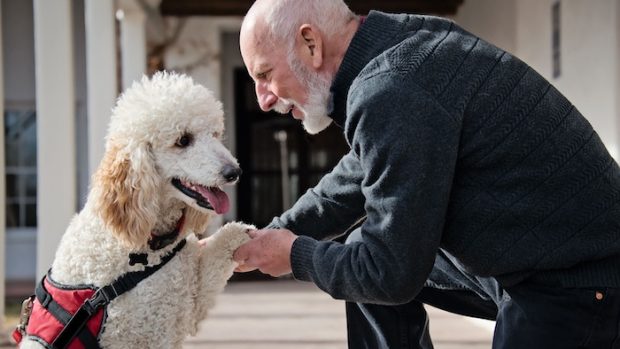A service dog can provide a wide range of benefits for individuals with disabilities. From assisting with tasks such as fetching objects to providing emotional support, service dogs can improve a person’s quality of life in a number of ways. That’s why it’s an awesome idea for anyone, no matter what their disability is. In this article, we outline the five benefits of getting a service dog and why they’re so valuable. Are you ready to learn more?

What is a service dog?
A service dog is a pet trained to assist people with disabilities. This may include retrieving items, alerting their owner of imminent danger, or assisting with daily tasks. Service dogs are specially trained to do work or tasks specific to an individual’s disability and cannot be performed by a person without help.
Some expected benefits of having a service dog include increased independence, decreased anxiety levels and improved overall quality of life. They can also provide socialization for people living alone or with a few friends outside the disability community.
So how to make your dog a service dog? You must first obtain certification from the Assistance Dog Foundation of America (ADFA) to make your dog a service dog. After meeting ADFA’s stringent eligibility requirements and passing an evaluation, your dog will be issued an identification card that proves he or she is a certified service animal. You’ll also need to register with the state where you live as the owner and caretaker of the service animal. Then, keep all documentation safe and updated when traveling so officials know why your pet is accompanying you.
1. Help people with physical disabilities live independently

Service dogs can help people with physical disabilities live independently by performing tasks typically requiring significant assistance, such as carrying groceries or opening doors. According to The Guide Dog Foundation of America, a service dog “may provide complete independence in living areas including the home and outdoors.”
The benefits of having a service dog are plentiful and extend far beyond the individual who needs them. Service dogs have improved moods and quality of life for everyone involved. They contribute to an environment of emotional stability and security for their handler, which can enhance overall mental health. Plus, when properly trained and socialized, service dogs promote self-confidence in those who use them.
2. Support to people with mental health disorders
A service dog can provide the companionship and security that a person with mental illness needs to stabilize his or her life. According to National Alliance on Mental Illness, a robust support system–including a faithful companion–can “enhance an individual’s sense of self-worth, confidence, and self-control,” which are all crucial components of effective therapy.
Service dogs also receive specialized training to alert people with a mental illness whenever their handler is having an episode so that this person has valuable time to get help before the situation becomes severe enough for them to be hospitalized or arrested.
Service dogs can significantly reduce the potential for a person with mental illness to become a danger to himself or others, saving thousands of dollars in court costs, jail time, and hospitalization. That’s why “many experts predict that service dogs will have a major impact on the cost to treat people with mental illness.”
3. Service dogs can aid veterans suffering from PTSD

Service dogs can provide tremendous relief to veterans suffering from PTSD. Service dogs can significantly improve their quality of life by providing companionship and help with tasks that are difficult or impossible for the veteran to do alone. Additionally, service dogs can help Calm and Distract Veterans when needed and Minimize Risk by detecting potential threats in their surroundings.
In many cases, these animals have been specifically trained to recognize trauma-related cues such as panting or rapid breathing in response to triggers such as loud noises or storms. This allows the veteran to live more confidently and freely without fear of returning flashbacks or nightmares.
Some have even been taught to help veterans with severe depression, which often occurs alongside PTSD. Service dogs can sense when their handler is about to have an episode and then do something to distract him or her from dwelling on the situation. This can vary from nuzzling the person’s hand with their nose until they put them to allow them to redirect their attention elsewhere or by barking loudly to get the veteran’s attention and lead them out into a public place where they can be around people and take their mind off of whatever was upsetting them.
4. Helpful to people recovering from mental illness

Many people hospitalized for mental health disorders struggle to reenter society and remain in the workforce due to paranoia about having another episode in a public place or fear of crowds, which are common symptoms of mental illness.
Service dogs can make it easier for these people to get used to being around large groups again by keeping them from being overwhelmed at places like malls and restaurants by using their canine senses as social buffers.
These animals also provide their handlers with the comfort of a constant companion when they are out in public. This is especially important for people who tend to isolate themselves and have difficulty making friends after hospitalization.
5. Help ease the fear that people with mobility issues face
People with mobility issues often suffer from panic attacks, especially after seeing steep stairs at stores or restaurants. They associate them with previous episodes in which they have collapsed into a panic and required medical attention.
Service dogs can prevent this by providing their handlers the comfort of knowing that they are not alone since service dogs are trained to bark whenever their handler feels a certain level of anxiety so that people who may be concerned about him or her can step in to help and get him or her through it safely.
Conclusion
If you have been thinking about getting a service dog but are still not sure if something is wrong with your mental health, there’s no harm in giving this article a read. The benefits of a service dog may motivate you to do the right thing for someone who needs it the most. If you still can’t decide whether or not to get a service dog, try taking an assessment. It will help you understand if assistance is needed and gives information on what kind of service animal might work best for you!
Read More:

